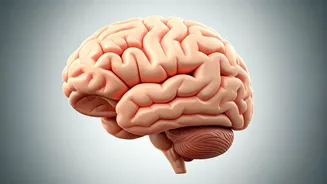Embrace Daily Exercise
Physical activity is far more than just staying in shape; it plays a crucial role in maintaining cognitive sharpness. Engaging in regular exercise, like
brisk walking, jogging, or cycling, enhances blood flow to the brain. Increased blood flow is critical because it delivers vital nutrients and oxygen, which are essential for brain function. Moreover, exercise supports the creation of new brain cells and the connections between them, which is referred to as neurogenesis. This process is instrumental in improving memory and learning abilities. Aim for at least 30 minutes of moderate-intensity exercise most days of the week to experience these cognitive benefits. Even short bursts of activity, like taking the stairs instead of the elevator or going for a quick walk during a work break, can contribute to significant improvements in brain health.
Prioritize Mental Stimulation
Keeping your mind active and engaged is just as crucial as physical exercise. Make it a point to regularly challenge your brain with various stimulating activities. This might involve learning a new skill, reading books, or engaging in puzzles, such as crosswords or Sudoku. Taking up a new hobby can also provide a great mental workout. These activities help to build cognitive reserve, which is the brain's ability to cope with age-related decline and the potential effects of diseases such as Alzheimer's. By continually learning and exploring new things, you stimulate different areas of your brain, strengthen neural pathways, and improve cognitive flexibility. Integrating mental exercises into your daily routine keeps the brain sharp and adaptable, contributing to sustained mental agility as you age. Consider varying these activities to challenge different aspects of your cognitive abilities and keep things interesting.
Nurture Quality Sleep
Sleep is often undervalued, but it is indispensable for both physical and cognitive health. During sleep, your brain consolidates memories, clears out waste products, and repairs itself. Poor sleep can lead to cognitive decline, difficulty concentrating, and increased risk of memory problems. Aim for 7 to 8 hours of quality sleep each night. Create a sleep-friendly environment by ensuring your bedroom is dark, quiet, and cool. Establish a regular sleep schedule, going to bed and waking up at the same time each day, even on weekends, to regulate your body's natural sleep-wake cycle (circadian rhythm). Avoid screen time (phones, tablets, and computers) before bed, as the blue light emitted from these devices can disrupt sleep. Make relaxation techniques like meditation or deep breathing a part of your pre-sleep routine to promote better sleep.
Follow a Brain-Healthy Diet
The food we eat has a direct impact on our brain health. A diet rich in brain-boosting nutrients can significantly enhance cognitive function and protect against age-related decline. Focus on incorporating foods that are high in antioxidants, healthy fats, and vitamins. Include plenty of fruits, vegetables, especially leafy greens and berries, and whole grains in your diet. Healthy fats, like those found in avocados, nuts, and olive oil, are crucial for brain health. Limit your intake of processed foods, sugary drinks, and excessive alcohol, as these can negatively impact brain function. Staying hydrated by drinking plenty of water is also essential for optimal brain performance. Consider supplementing your diet with brain-boosting nutrients if necessary, such as omega-3 fatty acids, but always consult with a healthcare professional before starting any supplements.
Manage Stress Effectively
Chronic stress can be detrimental to brain health, leading to cognitive impairment, memory problems, and an increased risk of mental health issues. Finding effective ways to manage stress is therefore paramount for maintaining a sharp mind. Incorporate stress-reducing activities into your daily life. Regular exercise is a great way to relieve stress and improve mental well-being. Practice mindfulness and meditation, which have been shown to reduce stress levels and improve focus. Engage in hobbies and activities that you enjoy, as these can provide a much-needed break from the stresses of daily life. Spend time in nature, which is known to have a calming effect. Ensure you maintain healthy social connections, as interacting with friends and family can provide emotional support and reduce feelings of isolation. If stress becomes overwhelming, consider seeking help from a therapist or counselor to learn coping strategies.
























